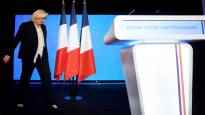Le Pen’s voters are ideologically committed far-right, but also frustrated and politically misguided, says researcher Louis Clerc.
The French presidential election has taken place. Center-right, liberal Emmanuel Macron was re-elected, but more closely than in previous elections.
Macron received 58.5 percent of the vote, while a rival, the far-right National Front Marine Le Pen voted 41.4 percent.
What is the point when four out of ten voters in France, a major European country, elect a far-right candidate?
– Much of that in itself, sums up the professor of political history Louis Clerc From the University of Turku.
In France, support for the values of the far right has risen and talk of restricting the rights of people of different origins, for example, has become mainstream. For example, the Republican Party Valérie Pécresse flirted with “conspiracy” theory in his campaign.
In other words, do almost half of the electorate sign an far-right election program for France?
According to Louis Clerc, a large number of ideologically committed far-right people have remained behind Le Pen from one election to another.
– They are prosperous basic conservatives and the core of the electorate, Clerc says.
One group of Le Pen voters is young nationalists, for whom nationalism is an adventure in the bottleneck of parties perceived as similar.
Variegated electorate
This time, however, there were many others in the electorate.
Not everyone who voted for Le Pen may be identified as far-right, but has stuck to a single message in the campaign, such as improving purchasing power.
– Typically, the far right has dealt with the economy in the past, mainly through the cost of immigration or protectionism, Clerc says.
In addition to the anti-Islamic and anti-immigration themes of the previous election, Le Pen raised concerns about social security for single parents, women’s safety or the high price of petrol.
Clerc refers to an extensive interview with Le Monde across France, which revealed that there are persistent and unemployed people in Le Pen’s support base under a heavy debt burden. On the other hand, the ranks included those who were indignant at various times, such as opponents of hunting restrictions or wind farms.
– Then there is a large part of those who are frustrated with political institutions and politically lost, who feel that Macron has done nothing for them.
– Some voters are poorly educated. In Le Monde’s poll, the argument often went so far as not to read the election program. People said they were non-politicized and would like to kick the system.
There is something for everyone in the “shopping bag”
Studied France and French populism Laura Parkkinen describes Le Pen ‘s election program as a shopping bag from which the voter can choose the item that seems most appropriate.
– This is a shopping bag, ie a kind of hybrid populism, where you can find everything from the environment to feminism, purchasing power and a softened image, Parkkinen describes.
Le Pen has also welcomed Ukrainian refugees.
– Usually populist parties are focused on one thing, but Le Pen has managed to squeeze a wide variety of whipped cream over the election program.
At the same time, Le Pen has taken a distance from his father, that is Jean-Marie Le Penin the most conservative values of the time, such as the disapproval of abortion or the questioning of the rights of sexual minorities.
– Unlike his father, Marine does not sacrifice energy for church attendance or gay unions. Indeed, many traditional Catholic voters did not vote at all in the second round because Macron and Le Pen are too liberal for them, Parkkinen says.
Yet the strict front line of the National Front on immigration, Islam and the rights of non-native French has not disappeared from the program anywhere.
– Marine Le Pen has managed to pull this into the background, bringing in a softer and middle-class female perspective, and making a cosmetic stern difference to Father Le Pen.
Identity is the eternal theme of French elections
National identity has been a special theme in French politics for 30 years, Parkkinen points out.
– The positive thing is that we are building France together and waving tricolor.
In order to prevent, among other things, the rolling of the English language, the French Parliament passed a law in 1994 requiring the authorities to avoid English and to use the French word, if any.
This horn of abundance has been exploited in various ways by police and parties, some more aggressively, some more moderately.
– Recalling the French election of 2007, even then the Socialists Segolénè Royalen the biggest campaign theme was national identity, Parkkinen recalls.
Socialists François Hollanden during the discussion of halal meat, the Republicans Nicolas Sarkozy again, he sought the land of Jean-Marie Le Pen by campaigning for his Christianity.
Parkkinen and Clerc see the vague discussion of Muslim women’s scarves as one of the hallmarks of politics in the 2010s and 2020s.
– Although the speech is directed against the interests of Muslims, it is presented as a cultural act that liberates women, Parkkinen says.
You can discuss the matter on April 26th. until 11 p.m.
